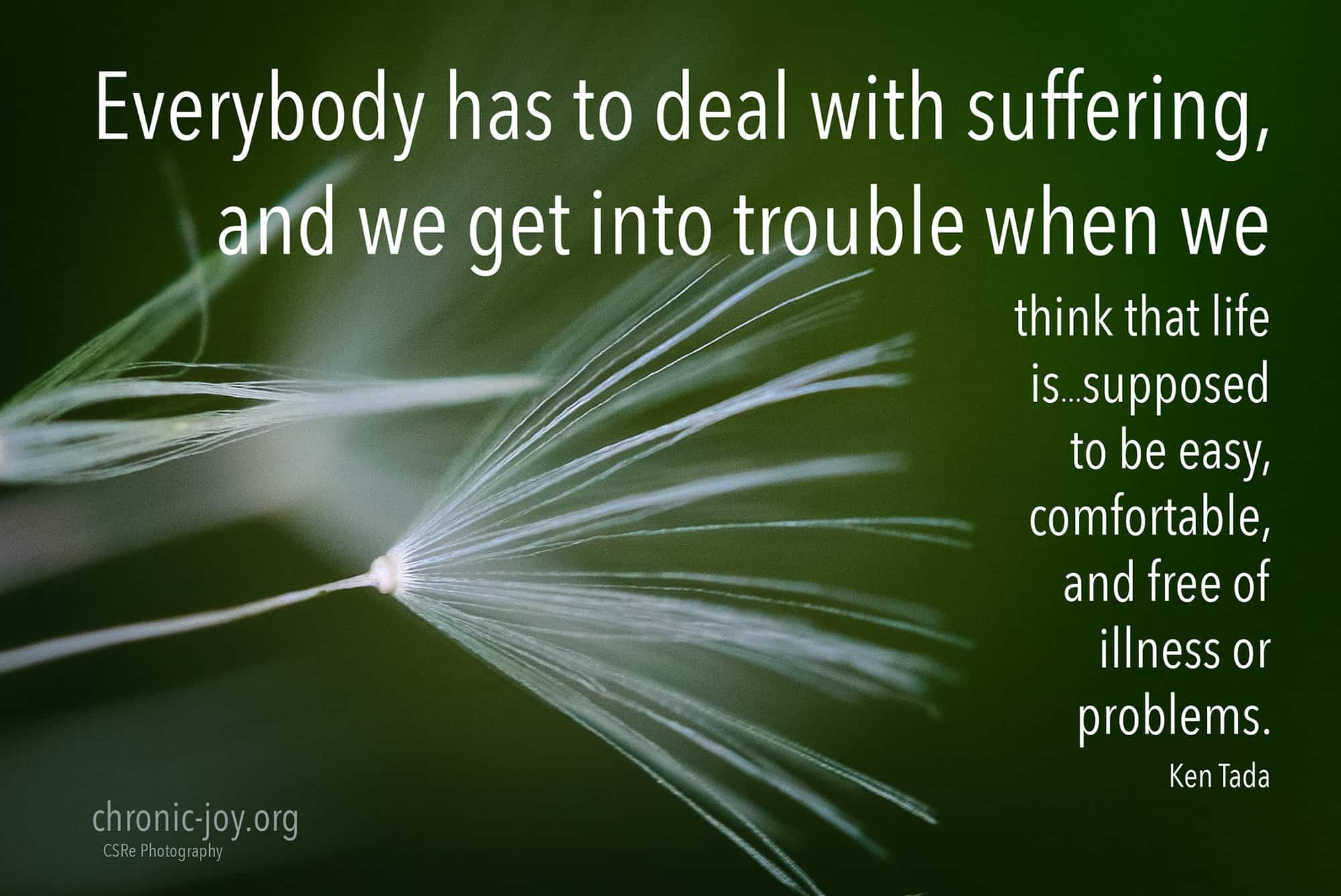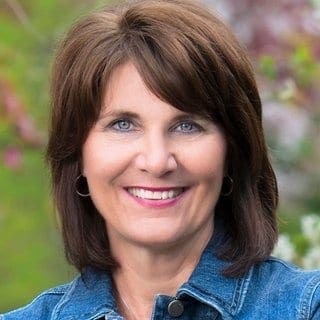.

Everybody has to deal with suffering, and we get into trouble when we think that life is … supposed to be easy, comfortable, and free of illness or problems. ~ Ken Tada
What it Means to be a Caregiver
Ken Tada knows what it means to be a caregiver. For the last 34 years, he has been taking care of his quadriplegic wife, Joni Eareckson Tada. Joni has not only been bound to a wheelchair for 50 years, but she has suffered both from terrible chronic pain (in the only part of her body that has feeling) and (more recently) breast cancer.
Ken gladly signed up to be a caregiver when he took his vows on their wedding day (In sickness and health, for better or worse.) He has never regretted his decision to marry Joni with her quadriplegia, even amid the many nightmarish ordeals related to her health and the mundane day-to-day routines. Due to Joni’s disability, Joni and Ken have experienced their fair share of challenges that have felt overwhelming at times. Their marriage has been tested. Through it all, Ken has learned that without Christ firmly in the center of the suffering, a caretaker can crack under the pressure of loneliness, guilt, and despair – but God has given him grace as a caregiver.
Ken graciously agreed to share with Just Between Us what he’s learned through his years as a caregiver and how caregivers can find grace, hope, encouragement, and purpose in their caregiving roles.
JBU: When you married Joni, you knew you were signing up for life as a caregiver. What surprises have you encountered that are different from what you thought?
Ken: When Joni and I first married, I don’t think we had any idea how hard marriage with a disability would be. The biggest surprise was how emotionally wearing the day-to-day routines quickly became – but just asking for help really took the load off, and it was amazing how having “a little bit of help” around the house lifted our spirits. Thankfully, there are about eight women who help Joni get up during different mornings and five who help her with her nighttime routines. This takes a huge load off me. The best part is Joni enjoys the responsibility of managing their duties. It’s not my responsibility – and that takes away the psychological pressure. This gave us the confidence that we could really do this thing called marriage!
JBU: How have you risen above the challenges related to Joni’s health and the daily routine that can be so difficult?
Ken: I have by no means arrived at a place where I can say, “I’ve got this thing down pat.” Every day, I have to go to God for His help. That’s because every day always brings new challenges. One day, Joni might be feeling well, but the next day, she’ll be struggling with pain. One day, she might not be able to breathe, and the next, she may have a pressure sore. So, every day, I’m pushed to lean on God – but that’s not a bad place to be.
JBU: What has been the hardest thing about being a caregiver?
Ken: The hardest thing about being a caregiver is the never-ending routines that are the same day after day. It’s relentless. It’s 24/7 (for instance, getting up every night to turn Joni in bed to a different position). As Joni and I get older, it has become even more difficult. Still, we’ve learned to trust one another, be open and honest with each other, show mercy and tolerance toward each other, and especially show gratitude. Most of all, it forces us to keep going to God every day (often many times during a day) for His help – and that keeps the load light.
JBU: Have you ever thought, “This is more than I signed up for!”? If so, how did you work through those feelings?
Ken: I remember one night sitting on the side of our bed trying to tell Joni how trapped I felt. I had all this psychological pressure, and I just felt hemmed in. I felt guilty telling her all this, but I remember her reply to me, “Ken, if I were in your position, I’d feel the same way. So I don’t blame you.” It’s funny because nothing changed about the routine after that, but the burden had lifted – all because my wife understood me.
JBU: What has been the blessing?
Ken: The blessing is that Joni and I are much closer than if she were on her feet. We are each other’s best friends. I just don’t feel completely like me without her. Having that kind of union, that kind of intimacy, is really wonderful. Home is where she is – and home for her is where I am. So when we travel together, we feel like we’re at home.
JBU: Many marriages would never survive the kind of stress you have; how have you kept your marriage strong amid a chronic disability and illnesses?
Ken: We take one day at a time, always trying to keep The Big Picture. Day-to-day routines can make life seem so ordinary, but if we remember to keep the big picture, life becomes an adventure. We have a mission together. God is using us for His purposes, our lives are on display, we can encourage others by our obedience, and our prayers together have more power than if we prayed solo.
JBU: Tell us how you keep yourself from becoming bitter when you are surrounded by such intense suffering: paralysis, chronic illness, cancer, etc.?
Ken: I try to remember that suffering is just a part of everyday life for us all. Life is wired to be difficult. It’s supposed to be hard. After all, we live in a fallen world. Everybody has to deal with suffering, and we get into trouble when we think that life is supposed to be easy, comfortable, and free of illness or problems. As I often say, “None of us is getting out of here alive,” so we shouldn’t be surprised when illnesses and bad medical reports are the order of the day.
JBU: What is the secret to good caregiving?
Ken: One secret is thinking of yourself primarily as the husband, not the nurse. There’s a Bible verse from Colossians 3:23 I often like to quote, which says that whatever we do, we should do it with an eye to God’s glory, for it is Christ we are serving. I haven’t given up my life to serve Joni. I’ve given up my life to serve God – and that’s a healthy perspective.
JBU: What five things would you recommend for surviving as a caregiver?
Ken:
- Find another friend to whom you can be accountable – someone who will pray for you and with whom you can share your needs.
- Get plenty of exercise.
- Know that it’s okay to ask for help.
- Don’t think of your spouse as your caregiving project; she is primarily your wife.
- Take breaks!
JBU: How does a caregiver avoid burnout?
Ken: Joni and I have seen too many couples who try to “go it alone.” Maybe the wife feels comfortable only if her husband does all the routines – or vice versa. Nothing will burn a caregiver out quicker! Caregivers need to be able to ask for help and take breaks. I love that my wife always encourages me to go fly fishing with my buddies. Not only do I enjoy having that physical break, but it really helps me emotionally.
JBU: How have you cared for yourself all these years as a long-term caregiver?
Ken: I have two friends, Pete and Jan, who pray for me, watch out for me, offer cautions, lunch with me, invite me over for cards, memorize Scripture with me – and one of them is my best fly-fishing buddy. Having these friendships has helped me go the long haul of living with Joni and her disability.
JBU: What has God taught you in this life-changing role?
Ken: I cannot imagine how my life would be without Joni. Our life together has brought me so much closer to Christ. We enjoy reading the Bible together every day and praying with each other many times during the day. I don’t think I’d be doing that were it not for Joni. As God told me some years ago, “Take good care of Joni. She’s the most precious gift I’ve given you.”
JBU: How have you learned to live in this “new normal” as a caregiver?
Ken: I try not to think about any health challenges that may happen next month or next year. Joni’s cancer may return. Her pain may get worse. There’s no sense worrying about tomorrow because there’s no grace available for that. I have to live one day at a time, leaning on God’s grace that is new every morning – and that’s a great way to live.
JBU: How do you find joy when the challenges of your situation are so great?
Ken: I think when we obey God, when we are in the middle of His will, the byproduct He gives is His joy – and the more we obey Him amid greater and greater challenges, the deeper His joy. Joni often says, “God gives His joy on His terms, and those terms call for us to (in some measure) suffer as His Son suffered when He walked on earth.” Suffering and joy are linked together.
JBU: How do you find time and energy to strengthen your marriage and have fun together?
Ken: Joni and I love to travel and enjoy new experiences. We like to go to the Sierras. Recently, we went to Hawaii, and I took her snorkeling where she saw a giant sea turtle. We go to the movies. She really enjoys my fly-fishing hobby. It can’t be all about the disability – and it’s not.
JBU: How do you keep going when you get so weary of it all?
Ken: I remember that it’s not my plan; it’s God’s plan. He knows how much I can take and how long I can take it. So it’s all a matter of trust in God and how He measures out my days. For every task, no matter how difficult, He gives the grace to match it!
*First published in Just Between Us magazine, Summer 2013 issue, and used with permission.


Shelly Esser
Editor of Just Between Us magazine
Shelly has been the editor of Just Between Us for more than 30 years. Additionally, she has been involved with leading and nurturing women since attending college. She and her husband have four adult daughters and two sons-in-law. They live in Menomonee Falls, Wisconsin.

Recent Comments